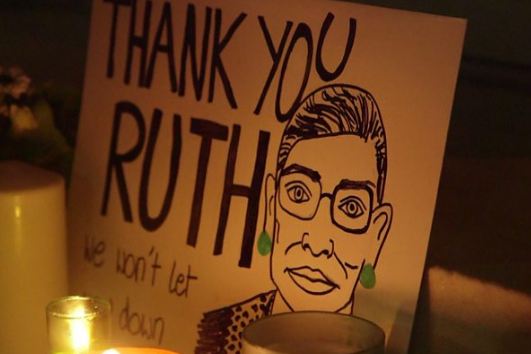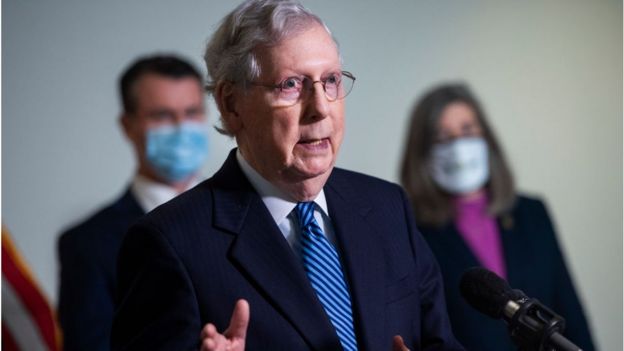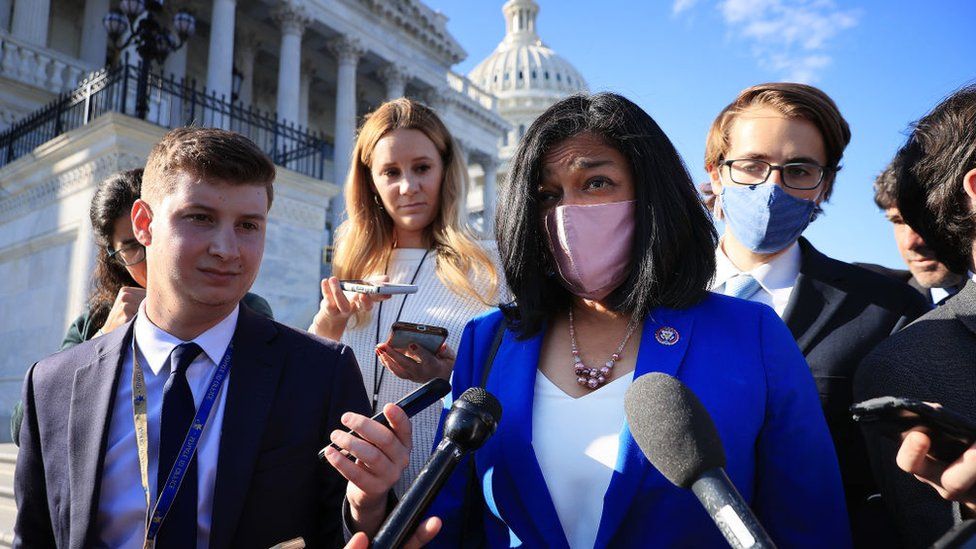Ginsburg Supreme Court: Trump to name nominee by week's end

US President Donald Trump has said he will name his nominee for Supreme Court justice by the end of the week, and urged the Republican-controlled Senate to confirm his choice before the presidential election.
The plan has launched a high-stakes battle ahead of the 3 November vote.
Mr Trump wants to replace Ruth Bader Ginsburg, a liberal stalwart who died on Friday aged 87, with a conservative.
He appears to have secured enough support in the Senate.
This would cement a right-leaning majority on the court, potentially for decades.
The ideological balance of the nine-member court is crucial to its rulings on the most important issues in US law.
Democrats have criticised Mr Trump's plan, with presidential candidate Joe Biden dubbing it an "abuse of power".
What happens next?
On Monday Mr Trump said that he was "constitutionally obligated" to nominate someone for the Supreme Court.
"We're looking at five incredible jurists... women that are extraordinary in every way. I mean, honestly, it could be anyone of them, and we're going to be announcing it on Friday or Saturday," he told supporters at a rally in Ohio .
The president earlier had a private meeting at the White House with potential nominee Amy Coney Barrett, an appeals court judge who is backed by anti-abortion conservatives.
Once the president names a nominee, it is the Senate's job to vote on whether to confirm them. The Judiciary Committee will review the pick first, and then vote to send the nominee to the floor for a full vote.
Senate majority leader Mitch McConnell has vowed to hold a confirmation vote before the election in November. Democrats have accused him of hypocrisy.
Following the death of conservative justice Anthony Scalia in 2016, Mr McConnell refused to hold a vote to confirm a nominee put forward by then-President Barack Obama, a Democrat.
 GETTY IMAGES
GETTY IMAGESMr Obama had nominated Merrick Garland in February of that year - months before the election - but Mr McConnell argued that Supreme Court justices should not be approved in an election year.
However, this time around, with a president of the same party, the Senate leader says because the Senate and White House are both Republican-held, unlike 2016, the nomination should proceed.
Do Senate Republicans have the votes?
Supreme Court nominees used to need 60 votes in the Senate to be approved. But in 2017, Mr McConnell held a vote to change the rules, so that nominees would need a simple majority of 51 votes in the 100-seat Senate. This enabled Senate Republicans to push through confirmation of Mr Trump's nominee Neil Gorsuch.
Republicans currently hold a 53-47 majority in the upper chamber.
The president's plan to appoint a justice was boosted on Monday after two closely watched senators of his party, Cory Gardner of Colorado and Charles Grassley of Iowa, signalled they backed moving ahead.
Their support may grant Republicans the 50 votes they need to confirm a justice, given that Vice-President Mike Pence can cast a tie-breaking vote if needed.
Lindsey Graham, the powerful Republican chairman of the Senate Judiciary committee, said on Monday he would be "leading the charge to make sure that President Trump's nominee has a hearing, [and] goes to the floor of the United States Senate for a vote".
Mitt Romney, of Utah, remains undecided. Susan Collins of Maine and Lisa Murkowski of Alaska, have backed a delay in the vote.
Ms Collins said she had "no objection" to the process of reviewing a candidate beginning now, but that she did not believe the Senate should vote on the candidate before November's election. Ms Collins is facing a tough re-election bid this year.
Ms Murkowski said she "did not support taking up a nomination eight months before the 2016 election" and believed the "same standard must apply" now.
Even if Republicans lose their Senate majority on 3 November, the new Congress does not take office until 3 January, which would give the existing senators time to confirm Mr Trump's pick.
If the nominee is not confirmed by 20 January, Inauguration Day, they would have to be re-nominated by the president (whoever that ends up being).









Comments